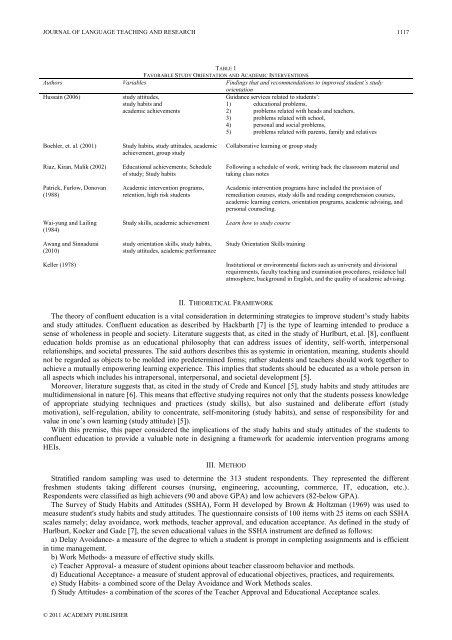Journal of Language Teaching and Research Contents - Academy ...
Journal of Language Teaching and Research Contents - Academy ...
Journal of Language Teaching and Research Contents - Academy ...
Create successful ePaper yourself
Turn your PDF publications into a flip-book with our unique Google optimized e-Paper software.
JOURNAL OF LANGUAGE TEACHING AND RESEARCH<br />
TABLE 1<br />
FAVORABLE STUDY ORIENTATION AND ACADEMIC INTERVENTIONS<br />
Authors Variables Findings that <strong>and</strong> recommendations to improved student’s study<br />
Hussain (2006) study attitudes,<br />
study habits <strong>and</strong><br />
academic achievements<br />
Boehler, et. al. (2001) Study habits, study attitudes, academic<br />
achievement, group study<br />
Riaz, Kiran, Malik (2002) Educational achievements; Schedule<br />
<strong>of</strong> study; Study habits<br />
Patrick, Furlow, Donovan<br />
(1988)<br />
Wai-yung <strong>and</strong> Lailing<br />
(1984)<br />
Awang <strong>and</strong> Sinnadurai<br />
(2010)<br />
© 2011 ACADEMY PUBLISHER<br />
Academic intervention programs,<br />
retention, high risk students<br />
orientation<br />
Guidance services related to students’:<br />
1) educational problems,<br />
2) problems related with heads <strong>and</strong> teachers,<br />
3) problems related with school,<br />
4) personal <strong>and</strong> social problems,<br />
5) problems related with parents, family <strong>and</strong> relatives<br />
Collaborative learning or group study<br />
Study skills, academic achievement Learn how to study course<br />
study orientation skills, study habits,<br />
study attitudes, academic performance<br />
Following a schedule <strong>of</strong> work, writing back the classroom material <strong>and</strong><br />
taking class notes<br />
Academic intervention programs have included the provision <strong>of</strong><br />
remediation courses, study skills <strong>and</strong> reading comprehension courses,<br />
academic learning centers, orientation programs, academic advising, <strong>and</strong><br />
personal counseling.<br />
Study Orientation Skills training<br />
Keller (1978) Institutional or environmental factors such as university <strong>and</strong> divisional<br />
requirements, faculty teaching <strong>and</strong> examination procedures, residence hall<br />
atmosphere, background in English, <strong>and</strong> the quality <strong>of</strong> academic advising.<br />
II. THEORETICAL FRAMEWORK<br />
The theory <strong>of</strong> confluent education is a vital consideration in determining strategies to improve student’s study habits<br />
<strong>and</strong> study attitudes. Confluent education as described by Hackbarth [7] is the type <strong>of</strong> learning intended to produce a<br />
sense <strong>of</strong> wholeness in people <strong>and</strong> society. Literature suggests that, as cited in the study <strong>of</strong> Hurlburt, et.al. [8], confluent<br />
education holds promise as an educational philosophy that can address issues <strong>of</strong> identity, self-worth, interpersonal<br />
relationships, <strong>and</strong> societal pressures. The said authors describes this as systemic in orientation, meaning, students should<br />
not be regarded as objects to be molded into predetermined forms; rather students <strong>and</strong> teachers should work together to<br />
achieve a mutually empowering learning experience. This implies that students should be educated as a whole person in<br />
all aspects which includes his intrapersonal, interpersonal, <strong>and</strong> societal development [5].<br />
Moreover, literature suggests that, as cited in the study <strong>of</strong> Crede <strong>and</strong> Kuncel [5], study habits <strong>and</strong> study attitudes are<br />
multidimensional in nature [6]. This means that effective studying requires not only that the students possess knowledge<br />
<strong>of</strong> appropriate studying techniques <strong>and</strong> practices (study skills), but also sustained <strong>and</strong> deliberate effort (study<br />
motivation), self-regulation, ability to concentrate, self-monitoring (study habits), <strong>and</strong> sense <strong>of</strong> responsibility for <strong>and</strong><br />
value in one’s own learning (study attitude) [5]).<br />
With this premise, this paper considered the implications <strong>of</strong> the study habits <strong>and</strong> study attitudes <strong>of</strong> the students to<br />
confluent education to provide a valuable note in designing a framework for academic intervention programs among<br />
HEIs.<br />
III. METHOD<br />
Stratified r<strong>and</strong>om sampling was used to determine the 313 student respondents. They represented the different<br />
freshmen students taking different courses (nursing, engineering, accounting, commerce, IT, education, etc.).<br />
Respondents were classified as high achievers (90 <strong>and</strong> above GPA) <strong>and</strong> low achievers (82-below GPA).<br />
The Survey <strong>of</strong> Study Habits <strong>and</strong> Attitudes (SSHA), Form H developed by Brown & Holtzman (1969) was used to<br />
measure student's study habits <strong>and</strong> study attitudes. The questionnaire consists <strong>of</strong> 100 items with 25 items on each SSHA<br />
scales namely; delay avoidance, work methods, teacher approval, <strong>and</strong> education acceptance. As defined in the study <strong>of</strong><br />
Hurlburt, Koeker <strong>and</strong> Gade [7], the seven educational values in the SSHA instrument are defined as follows:<br />
a) Delay Avoidance- a measure <strong>of</strong> the degree to which a student is prompt in completing assignments <strong>and</strong> is efficient<br />
in time management.<br />
b) Work Methods- a measure <strong>of</strong> effective study skills.<br />
c) Teacher Approval- a measure <strong>of</strong> student opinions about teacher classroom behavior <strong>and</strong> methods.<br />
d) Educational Acceptance- a measure <strong>of</strong> student approval <strong>of</strong> educational objectives, practices, <strong>and</strong> requirements.<br />
e) Study Habits- a combined score <strong>of</strong> the Delay Avoidance <strong>and</strong> Work Methods scales.<br />
f) Study Attitudes- a combination <strong>of</strong> the scores <strong>of</strong> the Teacher Approval <strong>and</strong> Educational Acceptance scales.<br />
1117

















